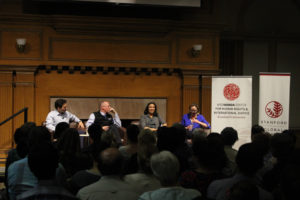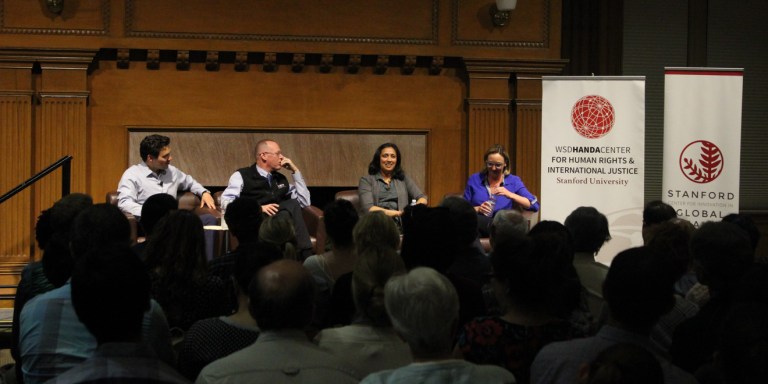Last week, Stanford’s Center for Innovation in Global Health (CIGH) hosted a pre-release screening of “Bending the Arc,” a documentary depicting the origins and growth of the global organization Partners in Health (PIH), a nonprofit dedicated to providing healthcare for marginalized communities.
The event was co-sponsored by Stanford’s chapter of PIH’s outreach initiative, PIH Engage, and the WSD Handa Center for Human Rights and International Justice. Following the screening, PIH-affiliated panelists, including PIH co-founder Paul Farmer, hosted a Q&A in which they elaborated upon their experiences and shared advice for how Stanford community members could get involved in global health.

Rachel Leslie, communications officer for CIGH and one of the lead organizers for the event, had seen the documentary previously at a private screening and was excited to initiate campus dialogue about the challenges of reforming health care.
“With Dr. Farmer being here, we thought it would be a fantastic opportunity to have a broader discussion about some of the challenges in last-mile health care delivery,” Leslie said.
According to Leslie, one of the most valuable aspects of the movie was its focus on the realities of implementing change, such as communicating with policy makers.
“How do you advocate on behalf of patients?” she said. “How do you shift policies so that they make the most sense for the patient populations that we’re trying to serve?”
The documentary follows the journeys of Farmer and other PIH founders as they seek to revolutionize how health care is provided for underserved communities in Haiti, Peru and other countries.
Farmer and his colleagues began their work in Haiti, working hard to gather the money and supplies to sustain a clinic. After initial setbacks, their first real successes resulted from training Haitian community members to check in on their neighbors who were undergoing treatment, in order to make sure the patients followed their medical regimens.
In Peru, Farmer and his colleagues encountered urgent cases of multi-drug-resistant tuberculosis (MDR-TB). PIH struggled to procure the medicines to eradicate the MDR-TB due to cultural and financial obstacles; policy-makers resisted providing drugs to treat patients due to the treatment’s expense. However, PIH managed to implement a new medicinal program with striking success.
As PIH continued expanding, many of its success stories resembled the group’s experiences in Haiti and Peru. PIH would often identify a problem in an underserved community, find existing drugs that would solve the issue and then face intense social opposition before it could raise the funds or resources to implement a solution.
“Bending the Arc” asks why people were dying in the countries PIH worked in even though treatments for the health issues they suffered from existed. The answer, often, PIH found, is that professionals believed the underserved communities featured in the film did not merit the financial resources needed to provide health care.
Elaborating on the themes in the documentary, Farmer emphasized in the Q&A session that policy-makers often misuse economic terms such as “sustainability” and “cost-effectiveness” to justify not providing healthcare for impoverished communities.
“This is not a critique of the concepts [like sustainability and cost-effectiveness],” Farmer said. “It’s how they’re used to impose or buttress low aspirations on behalf of other people — in particular, poor people.”
Panelist Cassia van der Hoof Holstein, director of PIH West — the PIH office located in San Francisco — highlighted how easily institutions forget about supposed economic restrictions when creating a sense of boundless technological possibilities.
“We say, ‘let’s send a manned mission to Mars,’” Holstein said. “We say ‘hey, let’s make a magnetic levitating train from San Francisco to Los Angeles.’”
But according to Holstein, when the discussion tilts to health topics such as curing cancer, people suddenly focus on finding complications and expressing concerns that the goals are impossible.
Panelists offered suggestions for how students in positions of power can best serve global health. Power, Farmer said, may simply mean the power to not go hungry.
Farmer also discussed the importance of involving people who are not clinicians, such as technological innovators and basic scientists, in the fight to improve global health. According to Farmer, sometimes a simple innovation, such as implementing a text messaging system to quickly provide patients with updates, can immediately make a large difference in quality of healthcare.
“That’s a question on my mind a lot,” Holstein said. “How do we expand our collective understanding of innovation to include the innovation of keeping six children alive on two dollars a day?”
At the same time, Director of Oncology at CIGH Ami Bhatt cautioned that it is better to ask a community what its needs rather than jump to using one’s skill set. She gave the example of creating an app and waiting until later to evaluate its usefulness.
Audience member Michelle Bulterys, research professional at the Stanford Cancer Institute, found that one of the most compelling parts of the event was being able to directly interact with the panelists.
“[They] have made an impact in hundreds of thousands of lives around the world,” Bulterys said. “That’s something I would aspire to do.”
Bulterys, who has struggled with balancing her educational path with her ambitions to enact social change, said that the event empowered her to believe that her goals were possible.
For Mika Koch ’19, team coordinator of the PIH Engage chapter at Stanford, viewing the film reinforced her belief in the significance of her work with PIH.
As Koch put it, though she “may not be in Haiti going to the clinics,” she contributes to global health by raising awareness of how social justice and health are interconnected.
“It’s a reminder that this is incredibly good work and incredibly powerful work,” Koch said.
Contact Claudia Heymach at cheymach ‘at’ stanford.edu.
